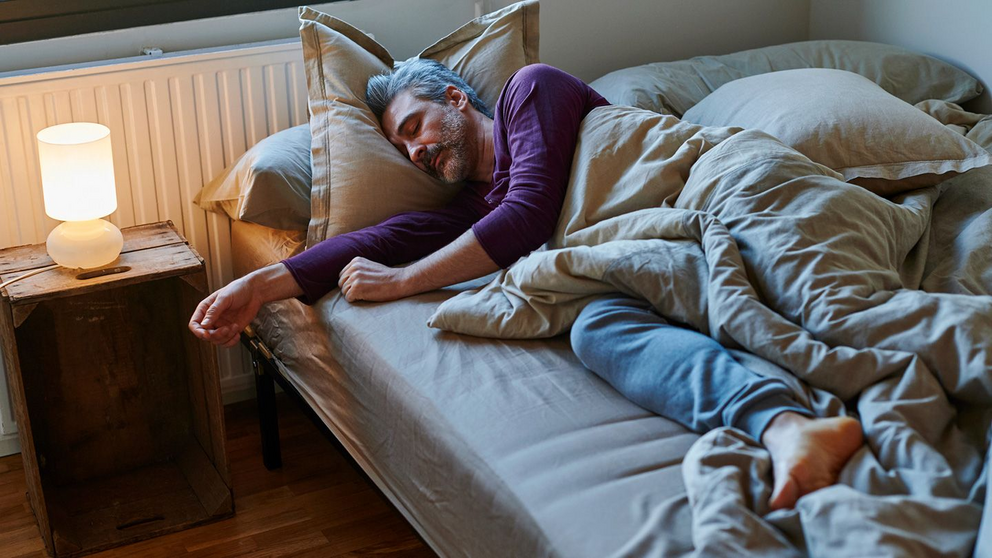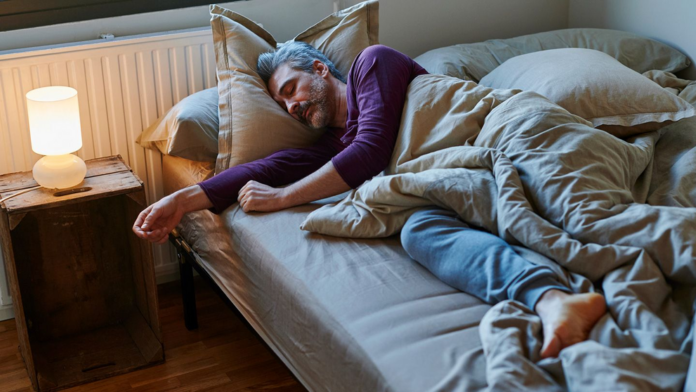
What causes sleep apnea?
Medically Reviewed by Michael Cutler, DO, PhD
Both preexisting chronic conditions (like diabetes and high blood pressure) and lifestyle choices (like smoking and alcohol use) can contribute to sleep apnea risk.
Sleep apnea is a common but potentially serious sleep disorder that affects an estimated 30 million people in the United States, according research published in August 2016 in the Journal of Clinical Sleep Medicine.
People who have sleep apnea experience interruptions in breathing that can last 10 seconds or more and occur repeatedly throughout the night, as many as 30 times or more in the span of an hour. This disturbs healthy sleep and also reduces blood oxygen levels during sleep, both of which can contribute to significant health problems, per the National Heart, Lung, and Blood Institute.
This chronic disruption of the normal sleep cycle can leave individuals feeling exhausted and sleepy during the day, and put them at increased risk for health problems associated with lack of sleep and with reduced blood oxygen levels during sleep, such as irritability, problems with memory or concentration, anxiety, and depression — even though the disruptions are typically so short most people don’t even realize they’ve been awoken during the night.
The condition can affect anyone, including children, Mayo Clinic notes.
But it tends to be most common in people who are older, heavier, and have large necks. The anatomical changes associated with all of those factors make a person more likely to develop the intermittent airway obstructions (resulting in pauses in breathing) during sleep that characterize obstructive sleep apnea (the most common type of sleep apnea).
Here’s a primer on what’s happening in the throat that causes obstructive sleep apnea, and all of the factors that can put you at a higher risk for developing it.
Sleep apnea doesn’t just interfere with your shut-eye; it can also increase your risk for heart disease, mood disorders, and more.
What’s Happening in Your Throat and Body That Causes Sleep Apnea
The most common type of sleep apnea is obstructive sleep apnea, and is caused by the throat muscles and the soft tissues in the back of the throat — including the adenoids (the tissue that sits just behind the nose high up in the throat), tonsils, and tongue — relaxing too much during sleep, causing repetitive obstruction of the upper airway. The adenoids are areas of tissue high in the throat that, in children, help trap germs. They usually shrink by the teen years, notes MedlinePlus.
People who have obstructive sleep apnea often snore loudly, although not everyone who snores has sleep apnea.
As the brain registers that you are not getting enough oxygen, it jolts your body awake to breathe. This is when a person who has obstructive sleep apnea starts breathing normally again with a snort, cough, or gasping or choking sound.
Another, much less common type of sleep apnea is central sleep apnea, which happens as a result of your brain not properly sending signals to the muscles that control breathing, per MedlinePlus.
It can often occur in people who have conditions such as a brain infection, stroke, or heart failure, or in people who take certain types of medication, such as opioids or benzodiazepines.
A third type of sleep apnea is complex sleep apnea syndrome, which is classified as a combination of both obstructive sleep apnea and central sleep apnea, according to an article published in October 2016 in Chest.
This is a condition that’s been identified fairly recently, and researchers are working to understand the primary causes of this type of apnea.
Factors That Put You at Higher Risk for Sleep Apnea
While anyone can develop obstructive sleep apnea, certain factors can increase your risk for this condition or mean you may be more likely to already have it, per MedlinePlus:
Obesity The most common risk factor for obstructive sleep apnea is carrying excessive weight. Some research has suggested rates of sleep apnea in people who are obese may be as high as 40 percent.
“Fat deposits in the neck and around the tongue and palate make the airway much tighter and smaller,” says sleep medicine specialist Neeraj Kaplish, MD, director of sleep laboratories and clinical associate professor of neurology at the University of Michigan in Ann Arbor. “It becomes much more [closed up] during sleep when you’re lying down.” (It should be noted that thin people can also have obstructive sleep apnea, and that not all individuals who are overweight have the condition.)
Large Adenoids or Tonsils Some people have large tonsils or adenoids, or smaller airways, which can contribute to problems breathing during sleep. Large adenoids and tonsils are the most common cause of obstructive sleep apnea in children, says Ronald Chervin, MD, director of the Sleep Disorders Centers and professor of sleep medicine and of neurology at the University of Michigan in Ann Arbor.
Jaw Misalignment or Size Some conditions or genetic factors can lead to an imbalance in facial structure that can cause the tongue to sit farther back in the mouth and lead to sleep apnea, says Robson Capasso, MD, chief of sleep surgery and associate professor of otolaryngology and head and neck surgery at Stanford University School of Medicine in California.
For instance, a lower jaw that’s shorter than the upper jaw, or a palate (the roof of your mouth) that’s shaped a certain way and collapses more easily during sleep can contribute to obstructive sleep apnea.
A Family History of Sleep Apnea If obstructive sleep apnea runs in your family, you may be at increased risk for having the condition. How your airway is shaped and your cranial facial characteristics can be inherited from your relatives, which can all play a role in whether and why you develop sleep apnea.
High Blood Pressure (Hypertension) People who have hypertension are more likely to have obstructive sleep apnea, as hypertension can result from untreated sleep apnea, notes the Sleep Foundation.
When you aren’t breathing properly, the oxygen levels in your body fall, and your brain sends an adrenaline signal to tell the body to tighten up the blood vessels to increase the flow of oxygen to the heart and the brain. This surge in adrenaline may then continue in the daytime, even when the person is breathing normally, setting the stage for hypertension.
Diabetes A study published in 2019 in the journal Diabetes Care found that people who have type 2 diabetes were 48 percent more likely to have sleep apnea than those without diabetes to be diagnosed with obstructive sleep apnea.
Being overweight or obese may be the link. But insulin resistance in diabetes may independently increase risk for apnea, too, while inflammation from apnea may increase risk for diabetes, the researchers note.
There are still a lot of unanswered questions about how sleep apnea might contribute to type 2 diabetes (or the reverse), but data published in a review published in November 2017 in Chest suggested that sleep apnea often goes undiagnosed in people with type 2 diabetes.
So, if you have been diagnosed with type 2 diabetes, it’s a good idea to be on the lookout for signs of sleep apnea, too — which, if left undiagnosed and untreated, could make it tougher to manage your diabetes, per past research.
“Upwards of three-quarters of people with diabetes have sleep apnea,” says James Rowley, MD, professor of medicine and division chief of pulmonary, critical care, and sleep medicine at Wayne State University School of Medicine in Detroit.
History of Stroke Stroke is linked to sleep apnea, but it’s not clear which is causing which, Dr. Chervin says. “As many as three-quarters of stroke patients have sleep apnea, and sleep apnea also raises the risk for stroke,” says Chervin. A history of stroke may cause sleep apnea, but sleep apnea may also be the cause of a stroke, notes the American Heart Association.
Sleep apnea leads to low oxygen levels and high blood pressure, both of which can increase one’s risk of a future stroke.
Chronic Nasal Congestion People who have persistent nasal congestion at night (regardless of the cause) are more likely to develop obstructive sleep apnea, probably because of the narrowed airways.
Smoking People who smoke are at a higher risk of developing obstructive sleep apnea. Smoking leads to inflammation in the upper airway, which can affect breathing as well as how well the brain communicates with the muscles that control breathing.
Alcohol Drinking alcohol can increase the relaxation of the muscles and tissue in the mouth and throat, increasing the risk of obstructive sleep apnea.
Asthma Research has found a link between asthma and obstructive sleep apnea risk.
The evidence suggests that patients with asthma are more likely to develop sleep apnea. Also, symptoms of either condition (especially poorly managed symptoms) can make symptoms of the other condition more severe. The relationship between the two conditions works both ways, Chervin explains: “Sleep apnea can make asthma worse and asthma can make sleep apnea worse.”
Heart Failure Both obstructive sleep apnea and central sleep apnea can be found in people who have heart failure, notes past research.
Heart failure can cause retention of sodium and water, and doctors suspect that the excess fluid may enter the lungs at night and lead to obstructive apnea. Heart failure also seems to be linked to problems with the respiratory control system, which may be a cause of central sleep apnea.
Brain Infection, Brain Tumor, Stroke, Conditions of the Spine, or Other Problems That May Affect the Brain Stem Conditions that compromise the brain stem, which is the area of the brain that controls breathing, can increase risk for central sleep apnea.
Medication, Such as Opioid Pain Relievers The neurological communication that happens between the brain and body to regulate breathing can be numbed by benzodiazepines and opioids, says Dr. Capasso. As a result, these drugs reduce airway muscle activation and can contribute to sleep apnea.
Gender and Age Sleep apnea can occur at any age, but being a male and getting older both put you at increased risk of developing sleep apnea, says Dr. Kaplish. “We don’t really understand why but it may have to do with fat distribution and hormones.” For instance, as we age, fatty tissue may increase in the neck and around the tongue.
What You Can Do to Prevent Sleep Apnea
Lowering your risk of developing sleep apnea is in large part about minimizing the risk factors that you have control over. Here are some of those steps you can take:

